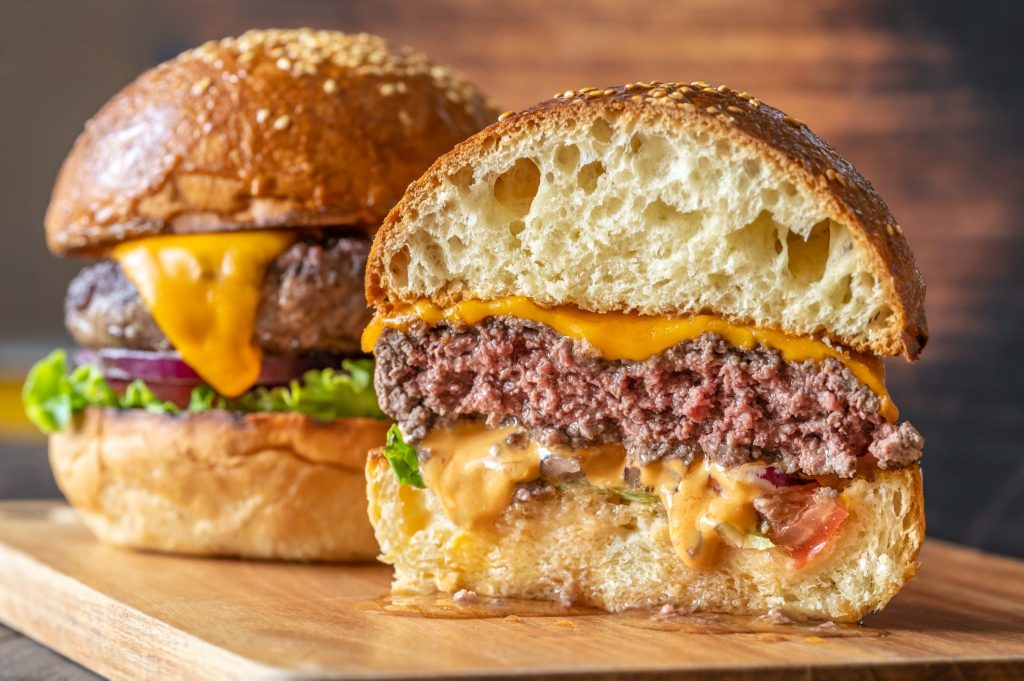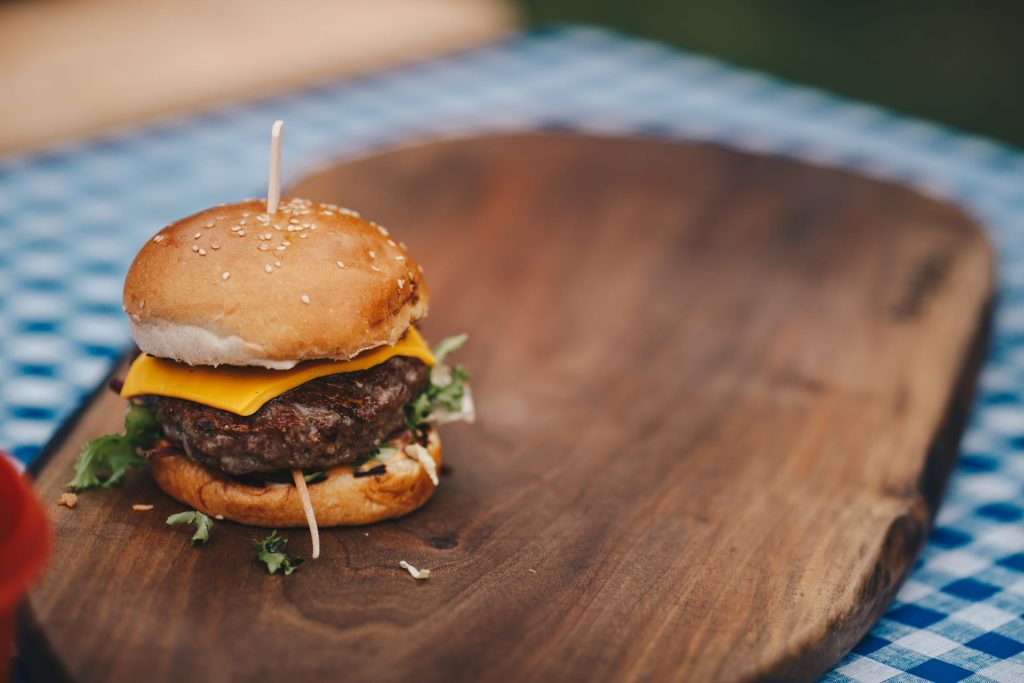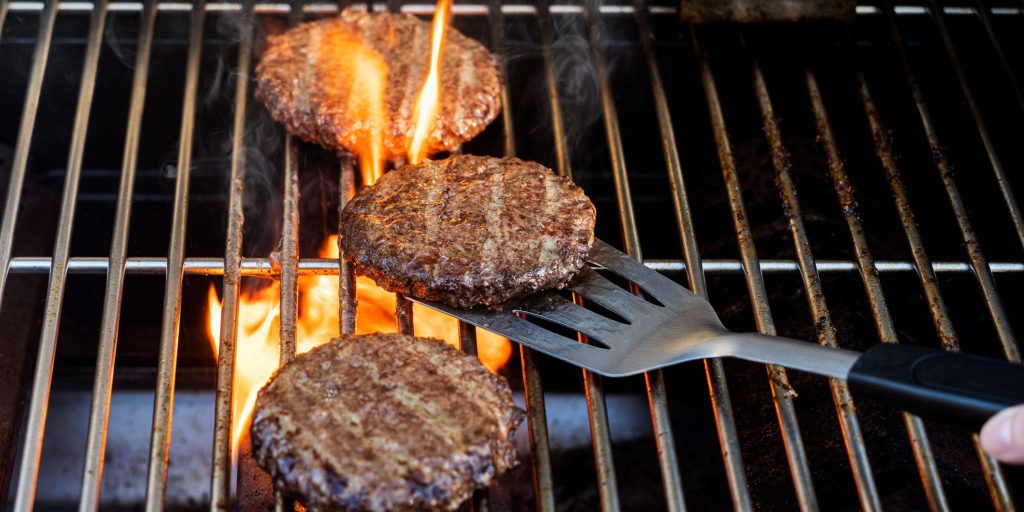Prices are accurate at the time of publication.
- It can take 5 to 10 minutes to grill burgers, depending on your desired doneness level.
- Check the internal temperature of the patties using a meat thermometer to find out if they're done.
- For best results, always let the burgers rest for a minimum of three minutes after grilling.
From pan-frying and broiling to air frying, there are lots of different ways to cook a burger. But when it comes to getting a nice char on the outside and a juicy interior, none of those methods can quite measure up to grilling.
Not only does grilling make for a more fun and social experience when weather permits, but Paddy Coker, the grill chef at Hawksmoor in New York City, says it also offers some unique advantages in the way of flavor.
Grilling burgers requires some special considerations, though: undercook them and you'll face increased safety risks, but overcook them and they'll end up dried out and lacking in flavor. Heed the following advice from pro chefs for guaranteed juicy, perfectly charred burgers.
Choosing the right level of doneness

Before you fire up the grill, you'll want to determine what "doneness" level you're going for. The doneness level will impact the texture and color of the burger, so keep that in mind when you're choosing. Use the following guide from NORMS Restaurants executive chef David Cox to figure out the right level.
Rare: Rare burgers are cooked for the least amount of time. They're typically seared on the outside and have a cool, reddish center, red juices, and a soft spongy texture.
Medium-rare: Medium-rare burgers have a golden brown crust, a juicy deep pink center, red or deep pink juices, and a slightly soft interior.
Medium: These have a light pink center, pink juices, and a slightly soft interior. When it comes to increased cook times, burgers tend to shrink as the water evaporates. You'll start to notice a difference in the size once you get to medium, medium-well, and well-done temperatures.
Medium-well: Medium-well burgers are similar to medium-cooked burgers, but have very little pink at the center, a firmer texture throughout, and clear juices.
Well-done: These are the most cooked with a heavier char on the outside. They're completely browned with no pink in the center, minimal clear juices, and a very firm texture.
How long to grill burgers
The cooking time for burgers can vary quite a bit based on how done you want them, how hot the grill is, and how thick the patties are, says Cox.
To prep the grill, start by brushing the grill grates clean. Then, oil the grill to prevent the burgers from sticking. You can do this by spraying oil directly onto the grates or by dipping a paper towel in oil, placing it between tongs, and wiping it across the surface. Preheat a gas grill on high until you can only hold your hand above it for a second or two. Or, heat a charcoal grill until the coals glow bright orange and begin to form ashes.
Regardless of what doneness level you're aiming for, Cox recommends "resting" the burgers — or allowing them to sit at room temperature for about three minutes — before serving and eating. Resting allows the meat to finish cooking, the juices to redistribute throughout the patty, and some of the fat to drain away. This is key for the right texture and taste, but it can also help you avoid a soggy bun.
Here's how long Cox and Coker recommend grilling burgers for each doneness level:
| Level of doneness | First side | Second side | Total cook time | Resting time | Internal temperature (degrees Fahrenheit) |
| Rare | 2 minutes, 30 seconds | 2 minutes, 30 seconds | 5 minutes | 3 minutes | 120-125° |
| Medium-rare | 3 minutes | 3 minutes | 6 minutes | 3 minutes | 130-135° |
| Medium | 3 minutes, 30 seconds | 3 minutes, 30 seconds | 7 minutes | 4 minutes | 140-145° |
| Medium-well | 4 minutes | 4 minutes | 8 minutes | 4 minutes | 150-155° |
| Well | 5 minutes | 5 minutes | 10 minutes | 5 minutes | 160-165° |
Tips to keep in mind

Follow these pro tips to achieve crave-worthy grilled burgers every time.
- Go for 80% lean beef: According to Cox, an 80 to 20 ratio is ideal for burgers — 20% fat is just enough to boost the flavor and moisture without being too greasy or causing pesky flame flare-ups.
- Use a thicker patty for lower doneness levels: If you prefer a medium-rare burger, Cox strongly advises using a patty that's at least ¾ of an inch to 1 inch thick.
- Be mindful of flare-ups: When fat drips down onto the burning charcoal or wood, it can cause a small grease fire, which can quickly scorch the meat. When cooking burgers with higher proportions of fat, Coker says you should always keep an eye on the burgers and be prepared with a spatula in hand to move them out of the way if a flame flare-up occurs.
- Load on the seasoning: Herbs and spices can instantly take your burgers to the next level, says Coker. Before grilling, try adding any combination of paprika, onion powder, black pepper, garlic powder, cayenne pepper, brown sugar, and Worchestire sauce to the patties. And don't be afraid to add a generous sprinkling of salt since a lot of it will fall through the cracks of the grill — according to Coker, salt not only brings out the flavor of the meat but also helps to form a nice crust on the patty.
Insider's takeaway
Grilling time for burgers can range from 5 to 10 minutes, depending on how done you like them, how hot your grill is, and how thick the patties are. The best way to tell if your burgers have reached the desired doneness level is to use a meat thermometer to check the internal temperature. For best results, aim for an 80% lean patty — and don't be shy with adding salt, pepper, and other seasonings. Before enjoying your burgers, always let them rest for at least three minutes after you take them off the grill.

